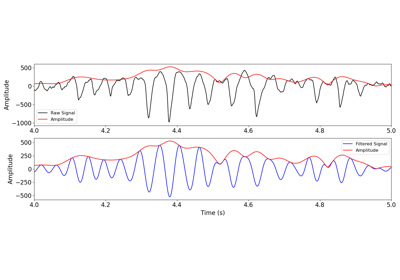neurodsp.timefrequency.freq_by_time¶
- neurodsp.timefrequency.freq_by_time(sig, fs, f_range=None, remove_edges=True, **filter_kwargs)[source]¶
Compute the instantaneous frequency of a time series.
- Parameters:
- sigarray
Time series.
- fsfloat
Sampling rate, in Hz.
- f_rangetuple of float or None, optional default: None
Filter range, in Hz, as (low, high). If None, no filtering is applied.
- remove_edgesbool, optional, default: True
If True, replace samples that are within half of the filter’s length to the edge with nan. This removes edge artifacts from the filtered signal. Only used if f_range is defined.
- **filter_kwargs
Keyword parameters to pass to filter_signal.
- Returns:
- i_farray
Instantaneous frequency time series.
Notes
This function assumes monotonic phase, so phase slips will be processed as high frequencies.
Examples
Compute the instantaneous frequency, for the alpha range:
>>> from neurodsp.sim import sim_combined >>> sig = sim_combined(n_seconds=10, fs=500, ... components={'sim_powerlaw': {}, 'sim_oscillation' : {'freq': 10}}) >>> instant_freq = freq_by_time(sig, fs=500, f_range=(8, 12))
